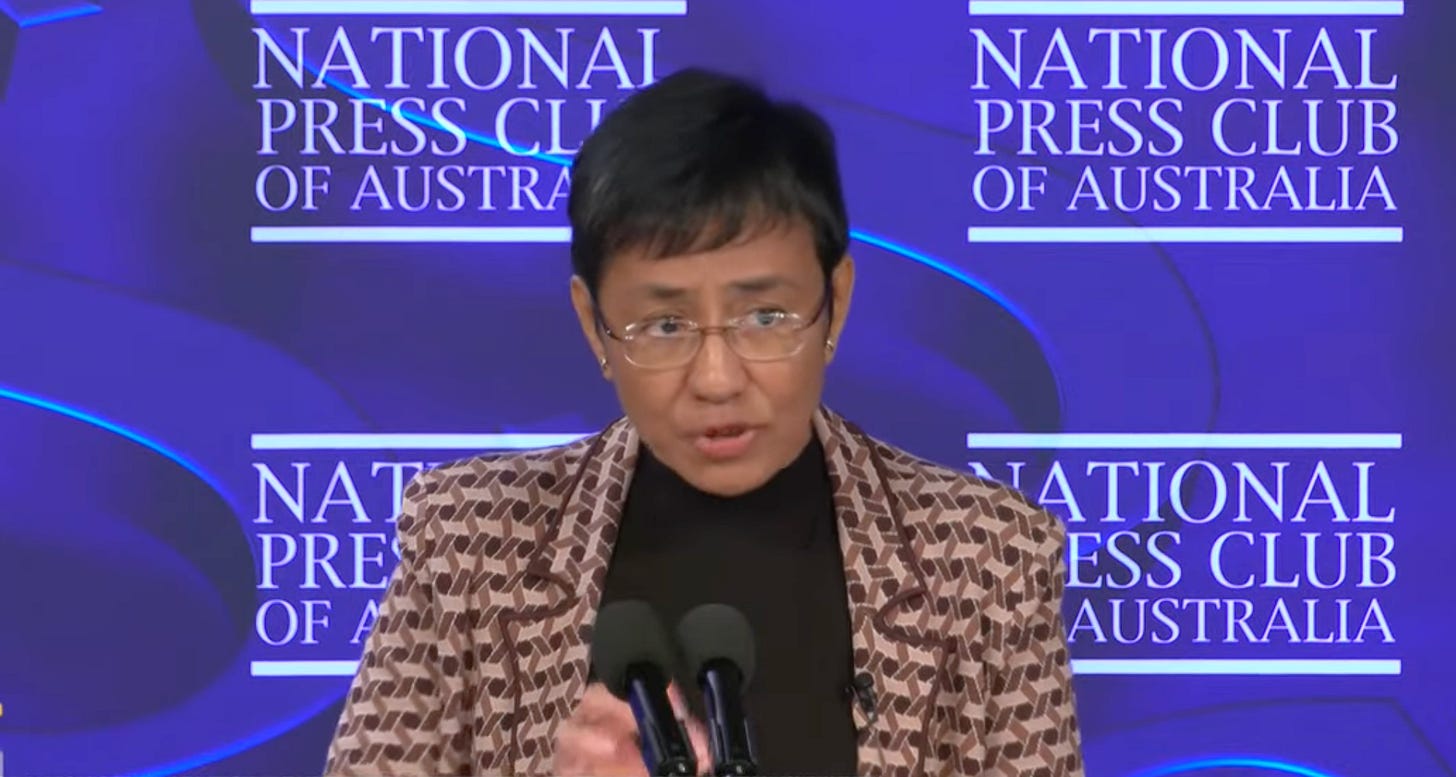Nobel Laureate Warns Australia 'Uniquely Vulnerable' to Information Warfare, Praises Social Media Ban
Today’s email is brought to you by Empower your podcasting vision with a suite of creative solutions at your fingertips.
Nobel Peace Prize winner Maria Ressa warned Australia faces unique vulnerabilities to information warfare and authoritarian tactics during a National Press Club address Monday, calling the nation's lack of constitutional press freedom protections a critical weakness in an age of global democratic decline.
The Filipino journalist, who co-founded news organization Rappler, told the Canberra audience that Australia sits at a "critical juncture" where concentrated media ownership and weak constitutional protections create dangerous conditions for press freedom erosion.
"Press freedom is not constitutionally guaranteed in your country," Ressa said. "A hyperconcentration of the media combined with occasional pressure from the authorities on media professionals endanger public interest journalism. This makes Australia uniquely vulnerable."
Ressa praised Australia's world-first social media ban for children under 16, describing it as "exactly the kind of bold action the world needs" while warning that more aggressive tech regulation remains necessary to protect democratic institutions.
Truth matters. Quality journalism costs.
Your subscription to Mencari directly funds the investigative reporting our democracy needs. For less than a coffee per week, you enable our journalists to uncover stories that powerful interests would rather keep hidden. There is no corporate influence involved. No compromises. Just honest journalism when we need it most.
Not ready to be paid subscribe, but appreciate the newsletter ? Grab us a beer or snag the exclusive ad spot at the top of next week's newsletter.
"Thank you, Australia, for your global leadership with your world first social media ban for children under 16," she said. "This landmark legislation, which takes effect in December 2025, is exactly the kind of bold action the world needs."
The journalist, who faced 11 criminal charges under former Philippine President Rodrigo Duterte's administration, connected recent anti-immigration protests in Australia to global patterns of information manipulation she has documented worldwide.
"I was shocked, to be honest, because if you talk about a nation of immigrants, isn't that you guys?" Ressa said when asked about weekend rallies that included neo-Nazi participants. "Disinformation or information operations works in two ways. There's a seeding of a metanarrative that no one really notices. But that metanarrative is then pounded exponentially and opportunistically."
Ressa described Australia's constitutional framework as providing "threadbare protection in an age of information warfare," noting the country relies on implied freedom of political communication rather than explicit press freedom guarantees.
She cited Australia's enactment of 82 national security laws since September 11, 2001, calling it "more than anywhere else in the world" and warning that combined with defamation laws, these create "a perfect storm for the erosion of press freedom."
Despite these vulnerabilities, Ressa acknowledged Australia's democratic advantages, including ongoing campaigns for media freedom protections.
"The Right to Know campaign, the calls for a Media Freedom Act, the constitutional referendum proposal, these are signs of a democracy that's fighting back before it's too late," she said.
The Nobel laureate described technology platforms as "weapons of mass destruction to democracy," referencing MIT research showing that "lies laced with fear, anger, and hate spread faster than facts."
"Their algorithms spread infection," Ressa said. "The business model that rewards engagement over facts has made all of us complicit in tearing apart our societies."
Ressa outlined three specific recommendations for Australia: regulate big tech more aggressively, build public interest technology infrastructure, and strengthen press protections through legislation.
On tech regulation, she criticized Australia's abandonment of proposed anti-disinformation legislation last year, calling it "a mistake."
"You don't really know until you're attacked, right?" she said. "The human rights we deserve in the physical world, we deserve in the virtual world. Platforms that profit from lies must be held accountable for the democratic damage they cause to users of all ages."
Ressa announced that her organization Rappler has begun building alternative technology infrastructure using the Matrix Protocol, an open-source, decentralized platform used by governments in France and Germany.
"We cannot keep feeding the machine that is destroying us," she said. "At Rappler, we've decided that empty promises from big tech are no longer enough."
The journalist described plans for "a global federation of news organizations" using secure, decentralized technology to create independent distribution networks.
"Our vision, our ambition is a global federation of news organizations. At least four other independent news groups are joining us before the end of the year," she said.
During questioning, Ressa addressed concerns about the effectiveness of age verification technology for social media bans, acknowledging imperfections while emphasizing cultural impact over technical perfection.
"We're not chasing perfection here, James, let's make that clear. We're chasing a meaningful difference," she said. "We're chasing significant impact and a cultural change in this country about what's acceptable and what's not acceptable."
When asked about implementation challenges, Ressa compared social media regulation to alcohol laws, suggesting companies should face accountability when underage users bypass restrictions.
"Like the law on alcohol, you also need to make sure that the companies don't just get away with, OK, what if those underage kids get through? Who's responsible for that, right?" she said.
Ressa connected Australia's situation to global democratic decline, citing Swedish research showing 72 percent of the world now lives under authoritarian rule.
"We're literally electing illiberal leaders democratically," she said. "Since the political dominoes fell in 2016, only one nation had the courage to stand up against this insidious electoral interference. And that's Romania at the end of last year."
The journalist warned that tactics used against media organizations in the Philippines are being replicated globally, including in the United States under President Donald Trump.
"President Trump's attacks on CBS, his $20 billion lawsuit against it, his threats to revoke ABC and NBC's broadcast licenses, his blocking of associated press access, these aren't random acts. They're strategic moves from an authoritarian playbook," she said.
Ressa described what she termed the "Filipinization of American politics," comparing Trump's rapid dismantling of institutional checks and balances to Duterte's approach.
"In the Philippines, it took Rodrigo Duterte roughly six months before the checks and balances of our Constitution. Because our Constitution is patterned after the United States," she said. "I would say President Trump did it faster within 100 days or so, 147 executive orders."
The journalist emphasized urgency in addressing information ecosystem problems, using basketball metaphors to describe the current moment.
"We're in the last two minutes of the basketball game. Anyone play basketball? Last two minutes. We can't fail," she said.
Ressa concluded with calls for "radical collaboration" among news organizations and warned against normalizing authoritarian behavior.
"To the journalists, you are democracy's immune system. When you're under attack, democracy is under attack," she said. "Don't normalize the abnormal. Don't both sides authoritarianism."
She urged media organizations to abandon reliance on major social media platforms, describing them as fundamentally corrupted by design.
"If you are in hell, no matter what you do, the fires of hell will be part of the environment you breathe. The toxic sludge of social media is not going to change. It is by design," she said.
The address occurred during Ressa's ninth day in Australia, including visits to Perth, Melbourne and Canberra. She required Supreme Court permission to travel from the Philippines, where she still faces potential imprisonment despite winning 10 of 11 criminal cases filed against her.
Ressa emphasized that democratic institutions require active investment and protection, comparing information infrastructure to physical infrastructure needs.
"Democracy isn't free. It requires investment," she said. "Just as governments invest in roads, bridges, and power grids, they must invest in the information infrastructure that democracy requires."
The journalist warned that Australia faces a crucial decision point regarding its democratic future.
"You have the time that other democracies have squandered. You have advantages the Philippines didn't have. You have institutions that America may be losing," she said. "The question now is, what will you do with the advantages you have?"
Ressa concluded with her signature framework connecting factual accuracy to democratic survival.
"Facts, truth, trust. These aren't journalistic principles. They're democratic necessities. They're what separates societies governed by law from those governed by fear," she said. "But don't take too long, Australia. Democracy's enemies are not waiting."
Got a News Tip?
Contact our editor via Proton Mail encrypted, X Direct Message, LinkedIn, or email. You can securely message him on Signal by using his username, Miko Santos.
Sustaining Mencari Requires Your Support
Independent journalism costs money. Help us continue delivering in-depth investigations and unfiltered commentary on the world's real stories. Your financial contribution enables thorough investigative work and thoughtful analysis, all supported by a dedicated community committed to accuracy and transparency.
Subscribe today to unlock our full archive of investigative reporting and fearless analysis. Subscribing to independent media outlets represents more than just information consumption—it embodies a commitment to factual reporting.
As well as knowing you’re keeping Mencari (Australia) alive, you’ll also get:
Get breaking news AS IT HAPPENS - Gain instant access to our real-time coverage and analysis when major stories break, keeping you ahead of the curve
Unlock our COMPLETE content library - Enjoy unlimited access to every newsletter, podcast episode, and exclusive archive—all seamlessly available in your favorite podcast apps.
Join the conversation that matters - Be part of our vibrant community with full commenting privileges on all content, directly supporting The Evening Post (Australia)
Catch up on some of Mencari’s recent stories:
It only takes a minute to help us investigate fearlessly and expose lies and wrongdoing to hold power accountable. Thanks!







